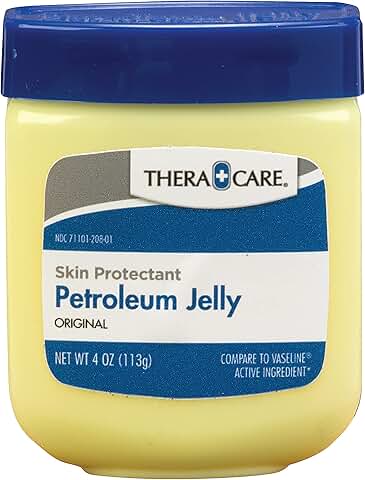When I found out I was pregnant, a whirlwind of emotions swept over me. Amidst the excitement and nervousness, one unexpected thought popped into my head: “What’s going to happen to my skin?” As someone who’s always been passionate about skincare, I was both curious and apprehensive about the changes my body – and skin – were about to undergo.
My pregnancy skincare experience turned out to be full of surprises, challenges, and unexpected joys. From sudden acne flare-ups to embracing my newfound “pregnancy glow,” I discovered that caring for my changing skin during pregnancy was an important part of my overall self-care routine and crucial for ensuring the health of my growing baby.
Understanding Pregnancy Skin Changes
Pregnancy triggers significant hormonal shifts that can profoundly impact your skin. Some women experience the fabled “pregnancy glow,” while others find themselves dealing with unexpected skin issues. Here’s what’s really happening beneath the surface:
The Hormonal Rollercoaster
During pregnancy, your body experiences a surge in hormones like estrogen and progesterone. These hormones can increase oil production, leading to that coveted pregnancy glow.
However, they can also trigger acne breakouts, especially if you’re prone to hormonal acne.
The increased blood flow during pregnancy also contributes to that radiant appearance. Your body produces up to 50% more blood during pregnancy, giving your skin a flushed, healthy look.
This increased circulation can also make your skin more sensitive and reactive to certain products or environmental factors.
Hyperpigmentation and Melasma
Up to 70% of pregnant women experience melasma, often called the “mask of pregnancy.” This condition causes dark patches to appear on the face, typically on the cheeks, forehead, and upper lip. While not harmful, it can be a source of frustration for many expectant mothers.
Melasma occurs because of the increased production of melanin, the pigment responsible for skin color. The hormonal changes during pregnancy can stimulate melanocytes, the cells that produce melanin, leading to these darker patches.
Here are two products you can check out on Amazon, but its best to consult a healthcare professional if you intend to use these products while pregnant or breastfeeding.
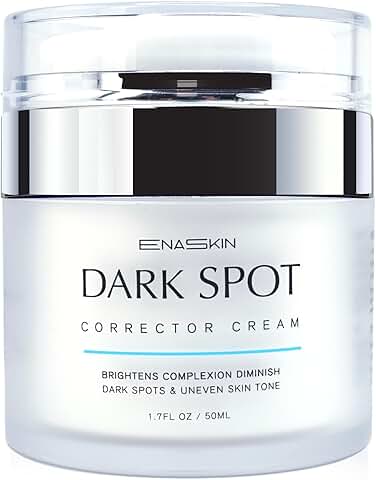
Dark Spot Remover for Face and Body: Hyperpigmentation Treatment
This dark spot remover is formulated with natural ingredients aimed at treating hyperpigmentation, including melasma, sun spots, and age spots. The cream is designed to even out skin tone and improve the appearance of dark spots on both the face and body. With its focus on natural ingredients, it may be a gentler option, but it’s always best to consult with a healthcare provider during pregnancy. Key ingredients likely include vitamin C, licorice extract, or niacinamide, which are often considered safe during pregnancy, but other ingredients should be checked for safety. Always read the label carefully to ensure no harmful chemicals are included.
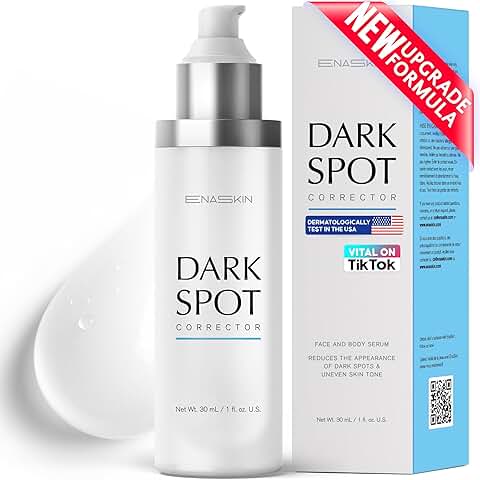
EnaSkin Dark Spot Remover for Face and Body
EnaSkin’s Dark Spot Remover is a serum formulated with niacinamide and other advanced ingredients aimed at treating dark spots such as age spots, sun spots, freckles, and melasma. Niacinamide (vitamin B3) is often praised for its ability to brighten skin and even out skin tone, and is generally considered safe during pregnancy. This product promises to provide a solution for hyperpigmentation, leaving skin looking clearer and more uniform. However, like any skincare product, it’s crucial to confirm the safety of all ingredients with your healthcare provider during pregnancy, especially if you’re sensitive to certain compounds.
Sun exposure can exacerbate this condition, making sun protection crucial during pregnancy.
Stretch Marks and Skin Elasticity
As your body grows to accommodate your baby, your skin stretches, sometimes beyond it’s natural elasticity. This can lead to the formation of stretch marks, which affect up to 90% of pregnant women.
Stretch marks typically appear on the belly, breasts, thighs, and hips.
While genetics play a significant role in their development, proper skincare can help minimize their appearance. Stretch marks occur when the skin’s collagen and elastin fibers break down because of rapid stretching.
Keeping your skin well-hydrated and nourished can help maintain it’s elasticity and potentially reduce the severity of stretch marks.
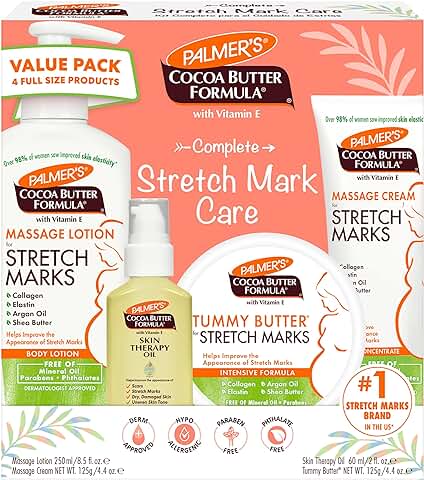
Palmer’s Cocoa Butter Formula Pregnancy Skin Care Kit is a dermatologist-approved, 4-piece set designed to help improve the appearance of stretch marks and scars during pregnancy. This nourishing kit includes a blend of cocoa butter, shea butter, and vitamin E, which work together to deeply hydrate and promote skin elasticity. The non-greasy formula is safe for sensitive skin and helps prevent and reduce the look of stretch marks, making it a thoughtful gift for moms-to-be. Free from parabens, phthalates, and artificial colors, it’s a gentle and effective option for pregnant women looking to care for their skin.
Creating a Pregnancy-Safe Skincare Routine
Now that we understand the changes our skin undergoes during pregnancy, let’s dive into creating a safe and effective skincare routine:
Gentle Cleansing
Start with a mild, fragrance-free cleanser. Harsh soaps can strip your skin of it’s natural oils, leading to dryness and irritation.
Look for products containing gentle ingredients like glycerin or ceramides.
These ingredients help maintain your skin’s natural barrier function while effectively removing dirt and excess oil.
I found that switching to a creamy, non-foaming cleanser made a significant difference in my skin’s comfort level. It’s important to cleanse twice daily, but avoid over-washing, as this can lead to increased oil production and potential breakouts.
Dickinson’s skin care products has a wide range of facial cleaners you can chose from and which is safe to use during pregnancy:

Dickinson’s Original Witch Hazel Pore Perfecting Facial Cleanser is a gentle, alcohol-free face wash that effectively removes excess oil while refining and clearing pores. Designed for normal to oily skin, it harnesses the natural astringent properties of witch hazel to balance and purify the skin without drying it out. This cleanser is free from parabens and harsh chemicals, making it a safe and effective option for expectant mothers looking for a reliable, pregnancy-safe facial cleanser that won’t irritate sensitive skin.
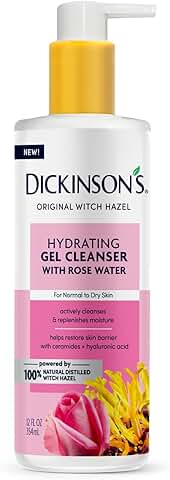
Dickinson’s Original Witch Hazel Hydrating Gel Facial Cleanser with Rose Water
Dickinson’s Original Witch Hazel Hydrating Gel Facial Cleanser with Rose Water is a soothing, alcohol-free face wash perfect for normal to dry skin. It gently hydrates and nourishes the skin while helping to calm redness and irritation, thanks to the combination of witch hazel and rose water. Free from parabens and synthetic fragrances, this cleanser is safe for use during pregnancy and ideal for those with sensitive skin. It provides a refreshing cleanse without stripping moisture, making it a pregnancy-friendly option for expectant mothers.
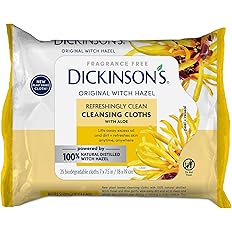
Dickinson’s Original Refreshingly Clean Daily Cleansing Cloths are infused with witch hazel and aloe, offering a quick and convenient way to cleanse the skin while soothing and refreshing. These alcohol-free wipes are perfect for on-the-go cleansing and are safe for sensitive skin, making them an ideal option for pregnant women. Free from parabens and artificial fragrances, these cleansing cloths help remove dirt and oil without irritating or drying out the skin, ensuring a gentle yet effective cleanse during pregnancy.
Hydration is Key
Pregnancy can make your skin more prone to dryness. Use a hydrating moisturizer, preferably one with hyaluronic acid, to keep your skin plump and supple.
Hyaluronic acid is a powerful humectant that can hold up to 1000 times it’s weight in water, making it an excellent choice for maintaining skin hydration.
Don’t forget to drink plenty of water throughout the day! Proper internal hydration is just as important as topical moisturizing.
Aim for at least 8-10 glasses of water daily to support your skin’s health and overall well-being.
Hydration goes far beyond only drinking plenty of water. Electrolytes play a crucial role in hydration.
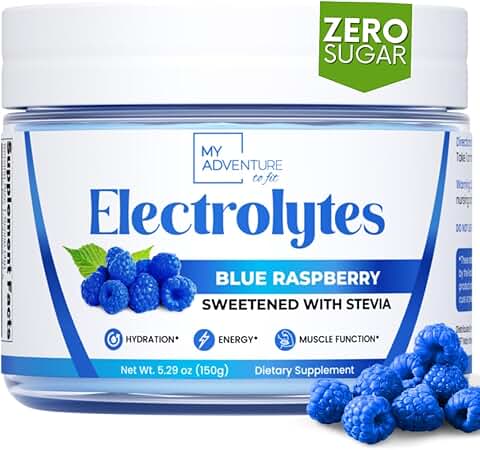
My Adventure To Fit offers a range of refreshing, electrolyte-packed hydration powders designed to support active lifestyles and improve hydration. Their products, like the Zero Sugar – Blue Raspberry Electrolytes Powder, are made with all-natural ingredients and come in a variety of delicious flavors such as watermelon candy, lemon candy, concord grape, apple candy, tangerine, juicy mango, sour blue candy, cherry passionfruit, banana cream, pear candy, and strawberry lemonade punch. Each powder is caffeine-free, vegan, keto, and paleo-friendly, ensuring a clean and healthy drink mix that is also free from added sugars. With 37 or 120 servings per container depending on which container you buy, these electrolyte powders are an excellent choice for maintaining hydration during workouts or throughout the day. When it comes to pregnancy, it’s always important to consult your healthcare provider, but My Adventure To Fit’s electrolyte powders, with their natural ingredients and absence of harmful additives, are generally considered safe for use during pregnancy as part of a balanced hydration routine.
Sun Protection
Pregnancy makes your skin more susceptible to sun damage and hyperpigmentation. Use a broad-spectrum, pregnancy-safe sunscreen with at least SPF 30 daily.
Physical sunscreens containing zinc oxide or titanium dioxide are generally considered safe for use during pregnancy.
Apply sunscreen generously to all exposed areas, including your face, neck, chest, and hands. Reapply every two hours, or more frequently if you’re swimming or sweating.
Consider wearing protective clothing and seeking shade during peak sun hours (usually between 10 am and 4 pm) for added protection.
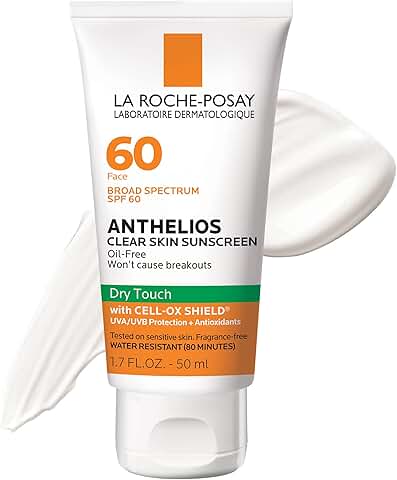
La Roche-Posay Anthelios Clear Skin Sunscreen Dry Touch SPF 60 is a high-performance, oil-free sunscreen designed for the face. It offers broad-spectrum SPF 60 protection with added antioxidants to shield against environmental damage. This non-greasy, fast-absorbing formula is free from harmful ingredients like parabens, oxybenzone, and fragrances, making it a safe and gentle option, especially for sensitive skin during pregnancy. It also absorbs excess oil, leaving a matte finish, perfect for those prone to breakouts or oily skin. The travel-size packaging ensures convenience on the go.
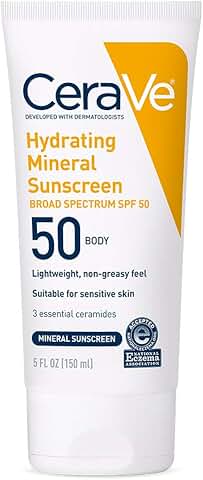
CeraVe 100% Mineral Sunscreen SPF 50 is a hydrating, oil-free sunscreen designed for the body, offering broad-spectrum protection with zinc oxide and titanium dioxide. Enriched with hyaluronic acid and ceramides, it helps retain moisture while protecting the skin from harmful UV rays. This non-greasy formula is free from parabens, fragrances, and other harsh chemicals, making it a safe choice for sensitive skin, including during pregnancy. Its mineral-based ingredients provide a gentle yet effective barrier against the sun, leaving the skin feeling moisturized and protected without any residue.
Targeted Treatments
For specific skin concerns, choose pregnancy-safe ingredients:
For acne: Look for products containing glycolic acid (in low concentrations) or benzoyl peroxide (with caution). Glycolic acid, an alpha-hydroxy acid (AHA), can help exfoliate the skin and unclog pores.
Benzoyl peroxide has antibacterial properties that can help combat acne-causing bacteria.
However, use these ingredients sparingly and always ask with your healthcare provider before incorporating them into your routine.
For hyperpigmentation: Try products with vitamin C or niacinamide. Vitamin C is a powerful antioxidant that can help brighten the skin and even out skin tone.
Niacinamide, a form of vitamin B3, can help reduce inflammation and improve skin barrier function.
Both ingredients are generally considered safe for use during pregnancy, but as always, check with your doctor first.
For stretch marks: Use cocoa butter or shea butter to improve skin elasticity. These natural emollients can help keep your skin supple and may reduce the appearance of stretch marks.
Massage these products into your skin daily, focusing on areas prone to stretching like your belly, hips, and breasts.
Navigating Common Pregnancy Skin Concerns
Acne Flare-Ups
If you’re experiencing pregnancy-induced acne, don’t panic. Focus on gentle cleansing and avoid the temptation to over-treat.
Spot treatments with benzoyl peroxide can be effective, but use sparingly and ask your healthcare provider first.
I found that incorporating a gentle, alcohol-free toner helped balance my skin’s pH and control excess oil without causing irritation. Look for toners containing ingredients like chamomile or green tea, which have soothing properties.
Managing Melasma
Prevention is key when it comes to melasma. Rigorous sun protection is your best defense.
If you do develop dark patches, don’t worry – they often fade after pregnancy.
In the meantime, products containing vitamin C can help brighten your complexion.
I found that using a wide-brimmed hat and seeking shade whenever possible, in addition to diligent sunscreen use, helped minimize the development of melasma during my pregnancy.
Combating Dry, Itchy Skin
Hormonal changes can lead to dry, itchy skin, especially on your growing belly. Keep your skin well-moisturized and avoid hot showers, which can further dry out your skin. Colloidal oatmeal baths can provide relief for persistent itching.
I discovered that applying moisturizer to damp skin immediately after showering helped lock in hydration. For particularly dry areas, I used an occlusive product like petroleum jelly to create a barrier and prevent moisture loss.
The Dos and Don’ts of Pregnancy Skincare
Do:
- Patch test new products before incorporating them into your routine. Apply a small amount of the product to a discreet area of skin and wait 24-48 hours to check for any adverse reactions.
- Opt for fragrance-free products to minimize the risk of irritation. Fragrances can be a common trigger for skin sensitivities, which may be heightened during pregnancy.
- Consult with your healthcare provider before using any new skincare products. They can provide personalized advice based on your specific health needs and concerns.
Don’t:
- Use retinoids or high-dose salicylic acid, as these ingredients may pose risks to fetal development. While the topical use of these ingredients in low concentrations is generally considered safe, it’s best to err on the side of caution and avoid them during pregnancy.
- Undergo chemical peels or other intensive skin treatments without consulting your doctor. These treatments can be too harsh for pregnancy-sensitive skin and may carry risks for your baby.
- Stress too much about skin changes – many will resolve after pregnancy. Remember that these changes are temporary and a normal part of the incredible process your body is going through.
Nurturing Your Skin Beyond Your Face
Pregnancy skincare extends beyond facial care. Here are some tips for taking care of your entire body:
Belly Care
Gently massage your growing belly with pregnancy-safe oils or creams. This can help improve skin elasticity and reduce itching.
Plus, it’s a great way to bond with your baby!
I found that creating a nightly ritual of applying belly oil helped my skin and gave me a moment of quiet connection with my growing little one.
Look for products containing ingredients like coconut oil, jojoba oil, or vitamin E. These natural oils are rich in fatty acids and antioxidants that can help nourish and protect your skin as it stretches.
Leg Care
Pregnancy can lead to swollen, achy legs. Elevate your feet when possible and consider using a pregnancy-safe leg cream to improve circulation.
Ingredients like witch hazel or horse chestnut can help reduce swelling and discomfort.
I found that regular gentle leg massages, combined with elevation and compression socks, made a significant difference in managing leg swelling and discomfort during my pregnancy.
Breast Care
As your breasts change to prepare for breastfeeding, keep them moisturized to prevent dryness and itching. However, avoid applying products directly to your nipples if you plan to breastfeed.
I used a gentle, unscented moisturizer on my breasts, being careful to avoid the nipple area. This helped manage the itchiness that came with my growing breasts without interfering with breastfeeding preparations.
Embracing Your Changing Skin
Throughout my pregnancy, I learned that skincare during this special time is as much about acceptance as it is about treatment. Some days, I reveled in my pregnancy glow.
Other days, I felt frustrated by sudden breakouts or dark patches.
But as I nurtured my changing skin, I also nurtured a deeper appreciation for my body and all the incredible changes it was undergoing to bring new life into the world. I realized that every stretch mark, every blemish, was a testament to the incredible process of motherhood.
As you work your way your own pregnancy skincare journey, remember to be gentle with yourself. Embrace the changes, both the challenging and the beautiful.
Your skin, like your body, is doing something truly remarkable.
Key Takeaways:
- Understand that skin changes during pregnancy are normal and often temporary.
- Create a gentle, pregnancy-safe skincare routine focusing on cleansing, hydration, and sun protection.
- Address specific skin concerns with targeted, pregnancy-safe treatments.
- Don’t neglect body care – your growing belly and changing breasts need attention too.
- Consult with your healthcare provider before introducing new skincare products or treatments.
- Most importantly, embrace your changing skin as part of the beautiful process of pregnancy.
Frequently Asked Questions
Is it safe to use retinol during pregnancy?
Retinol and other retinoids are generally not recommended for use during pregnancy because of potential risks to fetal development. It’s best to avoid these ingredients and ask with your healthcare provider for safe alternatives.
Can I get facials while pregnant?
Some facials can be safe during pregnancy, but it’s important to inform your esthetician about your pregnancy and avoid treatments that use harsh chemicals or excessive heat. Always ask with your doctor before getting any spa treatments.
How can I prevent stretch marks during pregnancy?
While you can’t completely prevent stretch marks, keeping your skin well-hydrated and using products with ingredients like cocoa butter or vitamin E may help improve skin elasticity. Genetics also play a significant role in stretch mark development.
Is it normal to develop skin tags during pregnancy?
Yes, it’s common for some women to develop skin tags during pregnancy because of hormonal changes. These small, harmless growths often appear in areas where skin rubs against skin or clothing.
Can pregnancy cause changes in mole appearance?
Hormonal changes during pregnancy can cause existing moles to darken or grow slightly. However, any significant changes in size, shape, or color should be evaluated by a dermatologist.
Are chemical sunscreens safe to use during pregnancy?
While physical sunscreens (containing zinc oxide or titanium dioxide) are generally considered the safest option during pregnancy, some chemical sunscreens may also be safe. Consult with your healthcare provider for personalized recommendations.
How can I manage pregnancy-induced acne without harsh treatments?
Focus on gentle cleansing, use non-comedogenic moisturizers, and consider spot treatments with pregnancy-safe ingredients like benzoyl peroxide (in low concentrations) or glycolic acid. Always ask your doctor before using any acne treatments.
Is it safe to use essential oils in skincare during pregnancy?
Some essential oils are considered safe during pregnancy, while others should be avoided. It’s best to ask with a qualified aromatherapist or your healthcare provider before using any essential oils in your skincare routine.
Can pregnancy hormones improve my skin condition?
For some women, pregnancy hormones can lead to clearer, more radiant skin – the famous “pregnancy glow.” However, others may experience increased breakouts or other skin issues because of hormonal changes.
How soon after giving birth will pregnancy-related skin changes resolve?
Many pregnancy-related skin changes, such as melasma and acne, often improve within a few months after giving birth. However, some changes, like stretch marks, may take longer to fade or may be permanent.
